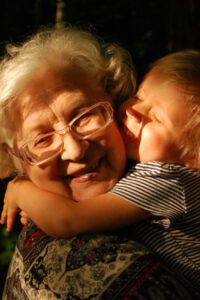Reducing Anxiety with Reiki: A Review of Some Scientific Evidence
 We all know that anxiety can be debilitating and have long-lasting effects on our physical and mental wellbeing. Fortunately, there is scientific proof that Reiki can help reduce anxiety. Reiki is a holistic healing practice that is becoming increasingly popular, and studies have shown that it can be an effective tool in managing anxiety for both adults and children. Here we will provide a review of some the scientific evidence to show how Reiki can be used to reduce anxiety in difficult situations.
We all know that anxiety can be debilitating and have long-lasting effects on our physical and mental wellbeing. Fortunately, there is scientific proof that Reiki can help reduce anxiety. Reiki is a holistic healing practice that is becoming increasingly popular, and studies have shown that it can be an effective tool in managing anxiety for both adults and children. Here we will provide a review of some the scientific evidence to show how Reiki can be used to reduce anxiety in difficult situations.
Scientific Evidence Showing Reiki Can Be Effective vs Anxiety
There is some scientific evidence emerging of the effectiveness of Reiki. One study conducted on patients with cancer-related fatigue found that Reiki was more effective than just rest as a treatment. Participants reported decreases in their overall fatigue levels, as well as positive effects on their physical, emotional, and cognitive fatigue. Another study found that Reiki had positive effects on anxiety in women with birthing and gynaecological issues. Participants who received Reiki reported less anxiety and some reduced pain compare to those who did not receive the treatment. Similarly, a study on the effectiveness of Reiki in reducing anxiety in children undergoing surgery found that those who received Reiki had lower levels of anxiety compared to those who did not.
While these studies provide promising evidence of Reiki’s effectiveness, more research is needed to fully understand the mechanisms behind its benefits and to determine its effectiveness for various conditions. However, for those seeking non-invasive, complementary methods to improve their well-being, Reiki may be worth exploring.
Study of Reiki vs Rest for Cancer-Related Fatigue & Anxiety
 A trial was conducted to determine the effectiveness of Reiki in treating fatigue in cancer patients compared to just rest. The results of the study were very promising. After Reiki sessions, the final scores for fatigue, pain, and anxiety were all lower than the pre-Reiki scores for each patient studied. Moreover, Reiki had a positive impact on the overall quality of life of these cancer patients. In fact, the study showed that Reiki significantly improved the quality of life of patients when compared to resting alone. This is great news for cancer patients who often struggle with debilitating fatigue and other physical and emotional challenges. Reiki’s non-invasive, gentle nature makes it an ideal complementary therapy to try along side traditional cancer treatments. As the results of this study show, Reiki may have potential to help cancer patients manage their symptoms and improve their overall well-being.
A trial was conducted to determine the effectiveness of Reiki in treating fatigue in cancer patients compared to just rest. The results of the study were very promising. After Reiki sessions, the final scores for fatigue, pain, and anxiety were all lower than the pre-Reiki scores for each patient studied. Moreover, Reiki had a positive impact on the overall quality of life of these cancer patients. In fact, the study showed that Reiki significantly improved the quality of life of patients when compared to resting alone. This is great news for cancer patients who often struggle with debilitating fatigue and other physical and emotional challenges. Reiki’s non-invasive, gentle nature makes it an ideal complementary therapy to try along side traditional cancer treatments. As the results of this study show, Reiki may have potential to help cancer patients manage their symptoms and improve their overall well-being.
Reiki's Positive Effects on Anxiety in Women with Birthing and Gynaecological Issues
A study conducted on Reiki’s effectiveness in reducing pain and anxiety in women hospitalized for obstetrical and gynaecological conditions showed significant results. The study included 33 women who received Reiki therapy during their hospitalization. The study found a statistical and clinical improvement in pain and anxiety scores following Reiki therapy. In fact, 92% of participants reported a reduction in pain, and 96% reported a reduction in anxiety. Additionally, 91% of participants reported that the effects of a Reiki session lingered for an unspecified period. This means that Reiki not only provided immediate relief, but the benefits lasted for an extended period of time.
The study provides evidence that Reiki is an therapy to reduce pain and anxiety in women admitted for obstetrical and gynaecological-related conditions in the acute care settings. The findings suggest that Reiki can be used as a complementary therapy adjunct to traditional medicine for women dealing with pain and anxiety related to these conditions. However, it is important to note that Reiki therapy should not be used as a replacement for medical treatment. Rather, it can be used as an adjunct therapy to complement the standard of care. This study provides evidence of Reiki’s effectiveness in reducing pain and anxiety and supports the growing body of research that highlights the benefits Reiki therapy.
Study on How Effective Reiki is Reducing Anxiety in Children Undergoing Surgery
 A study conducted on children undergoing surgery found that Reiki therapy can be effective in controlling anxiety. The study compared the post-operative pain scores of children in the intervention and control groups. While there was no significant difference in post-operative pain between the two groups, the comparison of the anxiety score showed a difference in the intervention group. This suggests that Reiki therapy can be implemented in clinical settings as a preparation for children to cope with anxiety before undergoing surgery. The study, published in the Journal of Alternative and Complementary Medicine, involved 70 children between the ages of 6 and 16. The intervention group received 30 minutes of Reiki therapy before the surgery, while the control group received 30 minutes of rest time before the surgery. The study found that the children who received Reiki therapy had significantly lower anxiety levels compared to the control group.
A study conducted on children undergoing surgery found that Reiki therapy can be effective in controlling anxiety. The study compared the post-operative pain scores of children in the intervention and control groups. While there was no significant difference in post-operative pain between the two groups, the comparison of the anxiety score showed a difference in the intervention group. This suggests that Reiki therapy can be implemented in clinical settings as a preparation for children to cope with anxiety before undergoing surgery. The study, published in the Journal of Alternative and Complementary Medicine, involved 70 children between the ages of 6 and 16. The intervention group received 30 minutes of Reiki therapy before the surgery, while the control group received 30 minutes of rest time before the surgery. The study found that the children who received Reiki therapy had significantly lower anxiety levels compared to the control group.
In conclusion findings of all these studies provide some scientific evidence that can be Reiki’s effective in reducing anxiety. With its non-invasive nature and low-risk profile, Reiki therapy can be used in clinical settings to improve the well-being of most patients. Furthermore, the positive results from this study suggest that Reiki therapy can be a useful tool in preparing people for medical procedures and potentially reducing their anxiety levels during hospitalization. More studies are required to form any concrete conclusions but, the growing evidence suggests Reiki therapy can be helpful for you.
